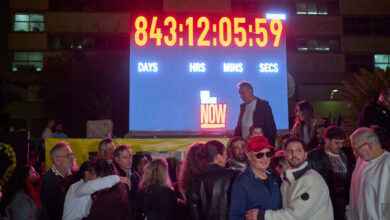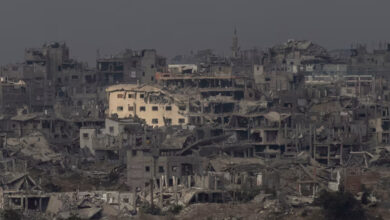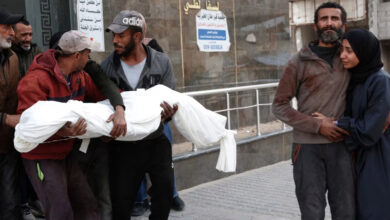The Campaign to Stop the Wall of Shame, a newly-formed activist movement based in Beirut, Lebanon, held a press conference this morning to publicize the Arab Contractors construction company’s role in the building of an underground steel wall along the Egypt-Gaza border.
Since June 2006, following the Palestinian legislative elections, Israel has imposed nearly total closure of the Gaza Strip — also enforced by Egypt — preventing the normal movement of goods and people to and from the territory. A smuggling trade has emerged as a result, via tunnels running between Gaza and Egypt. Egypt’s construction of the underground border wall is designed to undermine the tunnel trade, cutting off Palestinians in Gaza from what has become a lifeline.
The alleged role of Arab Contractors in assembling the steel wall was first reported by Al-Jazeera and Egyptian journalist Lina Attalah. Local sources identified the Egyptian company by name. According to the BBC, the wall’s steel panels were engineered and manufactured in the US. Press reports also implicate French engineers in the construction of the wall.
The campaign has attempted to independently confirm the company’s role in constructing and assembling the wall. After an initial call to the company’s Cairo headquarters, activist Abir Saksouk-Sasso sent a letter to the company’s offices in Sidon, Lebanon on 8 January 2010. On 12 January, activist Rania Masri received a call from the Egyptian Embassy’s Consul General in Beirut, Ahmad Hilmi, who said of Arab Contractors’ role in the building of the wall: "It is an Egyptian government company, and [building the wall] is an Egyptian decree."
Responding to the campaign’s concerns about the subterranean wall’s impact on the population of the besieged Gaza Strip, Hilmi said, "We have never hurt Palestinians." He added, "All Palestinians — each one — in Gaza is fine."
The American engineers who allegedly designed the wall plan to saturate the Palestinian side with salt water through subterranean pipes and channels. Deep water irrigation will diminish the structural integrity of the tunnels, causing them to collapse. When asked about the plan’s potential environmental impact on the coastal aquifer, Gaza’s source of potable water, Hilmi said, "There have been no studies on the effects of the plan."
Arab Contractors is owned by the Egyptian government and operates in 29 countries in the Arab world, including Kuwait, Yemen, the United Arab Emirates, Saudi Arabia, Lebanon, Qatar, Palestine (in Gaza), Oman, Algeria, Tunisia, Morocco, Libya and Sudan. According to sources in Gaza who declined to be identified, the Palestine branch of the company is basically defunct owing to the Israeli and Egyptian siege on the territory.
According to its website, the company was founded in 1917 by Osman Ahmed Osman and led the Egyptian effort to build the Aswan dam, completed in 1970. Over time the Egyptian government exercised greater control over company management. In 2001, it ousted Ismail Osman from the Chief Executive Officer post. The Egyptian government owns the company today.
During today’s Arabic-language press conference Saksouk-Sasso stated on behalf of the campaign: "The wall of shame is the latest in a series of official measures undertaken by the Egyptian government to besiege Gaza. First, the Egyptians closed the Rafah crossing into Egypt. The Palestinians dug cross-border tunnels to ensure their basic survival in response. The Egyptian government then demolished many of those tunnels and inundated them with gas to kill the tunnel occupants — this is according to the Israeli newspaper Haaretz. The third development was the Egyptian government’s refusal to allow caravans carrying humanitarian supplies to pass through the Rafah crossing to Gaza."
Activist Baha’a Al-Kayyali explained why the Arab Contractors company became the campaign’s target: "Our newly-created group … regards itself as only one segment of the outraged Arab and global response to the criminal action of the Egyptian regime. After conducting research … our group identified Arab Contractors as being partly responsible for building the wall. This company has two offices in Lebanon. And while we welcome anyone who seeks to improve Lebanon’s deteriorating infrastructure, [that work] must not come at the expense of the Palestinian people or any other people."
Activists pledged to pressure Arab Contractors and by extension, the Egyptian government, for their role in the siege of Gaza. Rania Masri told The Electronic Intifada: "Arab Contractors is more vulnerable and more capable of being influenced than the Egyptian government … But one protest, one press conference, one article will not be transformative and will not cause dramatic policy shift. Our actions must be measured to have an additive effect. This is one more step in a long journey."
Born in the Rafah refugee camp in the Gaza Strip, Ahmed Moor graduated from university in Philadelphia, after which he spent three years working in finance in New York. He is currently based in Beirut, Lebanon. This article was originally published in the Electronic Intifada.




